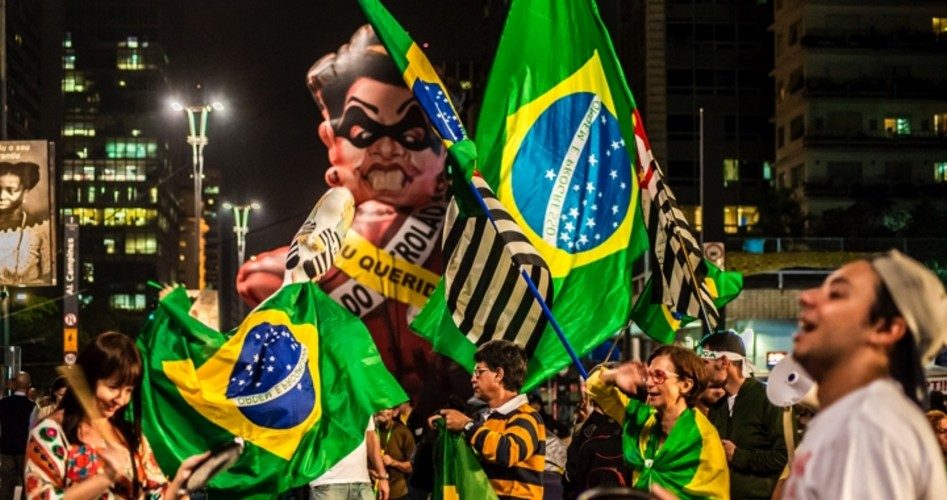
In a sudden unexpected move, early Tuesday morning Waldir Maranhão, the interim speaker of Brazil’s lower house (the Chamber of Deputies) reversed his previous decision from Monday to annul a Chamber of Deputies April vote that allowed impeachment proceedings to move forward. The upper house — the Federal Senate — was already moving toward a vote to impeach Brazilian President Dilma Rousseff when word came that the Chamber was going to have another vote on the matter.
With Brazilian politicians doing everything they can to stay out of jail, they are working hard to keep the public’s attention focused on Rousseff’s problems and away from their own. In March, Mihir Kapadia, the head of Sun Global Investments, a London investment firm that specializes in emerging-market opportunities, certainly sees one in Brazil: “[The] situation [in Brazil] has been made worse by high debt levels … [and] problems of governance, corruption and political issues [which] have created a perfect storm.”
That perfect storm had its beginnings with the election of Rousseff’s predecessor and mentor, a founder of the Brazilian Workers Party, closely associated with Brazil’s Communist Party. Taking advantage of the commodity boom, then-President Luiz Inácio Lula da Silva (“Lula”) expanded the welfare state to such an extent that he turned a country with 10 percent annual growth in GDP into one that currently is shrinking by more than four percent.
Lula’s protégé, Rousseff, oversaw the imposition of socialist welfare schemes that far exceeded the country’s ability to pay for them, exacerbated by the ravages of the Great Recession.
One of the projects that gave Brazilian politicians and their equally corrupt counterparts in the private economy their opportunity to rape and pillage was the discovery by the state-owned energy company Petrobras of enormous new oil reserves. The company estimated it would take $25 billion to develop the new oil fields, so it offered bonds to fund it. Contracts would be let, infrastructure would be expanded, refineries would be built, pipelines would be expanded — all rich opportunities for graft of the first order.
Operation Car Wash, launched by the Federal Police, began to expose the extent of the corruption and has reached more than half of those erstwhile lower house deputies voting on Rousseff’s demise. The investigation has touched nearly every top official in Rousseff’s administration with the single remarkable exception of Rousseff herself.
Her impeachment has nothing to do with Operation Car Wash, but instead is focusing on how she used state bank funds to pay for her 2014 reelection campaign. She has denied the charges, and, adding further insult to Brazilians watching the scene unfold, also denied knowing anything about the Petrobras corruption even while she was head of the company under Lula.
Now that the interim president of the lower chamber has reversed himself and is allowing the impeachment process in the Senate to proceed, a vote is expected later this week, with nearly every observer expecting that the Senate will vote to put her on trial.
That will automatically remove her from office for the next six months, her position to be filled by another miscreant suffering under his own legal problems, Michel Temer. An overwhelming number of Brazilians think he ought to be impeached along with Rousseff, and for the same reasons: using state bank money to enrich himself and his campaign.
Not so fast. Rousseff said, “We will appeal with every legal method available,” including appealing to the Supreme Court, which just happens to be packed with people nominated by Lula and Rousseff and friendly to the Workers Party’s ideology. The court could take months to consider the issue, insulating Rousseff from any further threats to her administration in the meantime.
That bodes ill for Brazilians who were hoping for some sort of positive change. Right now they are suffering mightily under the natural consequences of too much government run by corrupt officials who have considered their elected positions as entitling them to swill from the public trough at their pleasure. One in six Brazilians is unemployed, average household income has nearly been cut in half, and inflation continues to decimate the Brazilian real, which has lost more than a third of its purchasing power against the dollar in just the last year.
With corruption infesting every branch of the government, Rousseff’s promise that “this is just the beginning of the battle [to impeach me], which will be long and drawn out” appears to be one that she will keep.
Photo of demonstrators calling for the impeachment of Dilma Rousseff: AP Images
A graduate of an Ivy League school and a former investment advisor, Bob is a regular contributor to The New American magazine and blogs frequently at LightFromTheRight.com, primarily on economics and politics. He can be reached at [email protected].
Related articles:
Amid Impeachment, Marxist Brazilian President Cries “Coup” at UN
Brazil’s Lower House Votes to Impeach President Rousseff; Little Likely to Change
It Looks Like the End Is Near for Brazil’s President Rousseff



